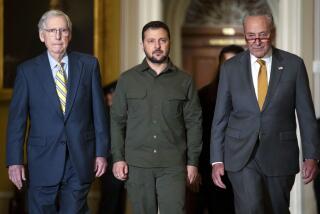McDonnell Chairman Denies Any Bailout by the Pentagon : Aerospace: Angry House panel is told that no funds were secretly funneled through the C-17 program.
WASHINGTON — During a three-hour grilling by an angry congressional panel, McDonnell Douglas Chairman John McDonnell insisted Thursday that his aerospace company was not secretly bailed out by the Pentagon and disputed assertions that it remains in financial trouble.
But William Reed, the Pentagon’s chief auditor, testified that McDonnell Douglas and the Air Force “deliberately misled” his auditors about certain payments made to the firm that have since been considered as part of an alleged bailout plan.
Reed also said an examination of the firm in October concluded that its financial condition “continues to be unfavorable,” based on the firm’s heavy debt, weak profit and continuing problems on its major defense program.
The hearing before the House Government Operations Committee was the third in a series that have probed the controversial events of 1990, when McDonnell Douglas was in serious financial trouble and was allegedly dealt several financial favors by defense officials.
The Pentagon inspector general said in two separate reports that senior Air Force officials erected a plan to improperly funnel $500 million in payments through the C-17 program to McDonnell Douglas in late 1990.
But McDonnell testified that it was the government that had breached the C-17 contract in July, 1990, by stopping payments without a legal basis. The dispute arose when the government’s contracting officer in Long Beach, where the C-17 is being built, rejected McDonnell estimates showing that it would break even on the first C-17 contract. The company would eventually incur massive overruns, currently projected at $1.2 billion.
McDonnell said the payment suspension had cost the firm more than $300 million by September, 1990, and would end up costing nearly $1 billion by the end of that year if left unresolved, prompting him to seek meetings with senior Pentagon officials.
“In none of those meetings was there any sort of secret agreement,” McDonnell told the committee, although members of the committee faulted him for failing to remember details about the meetings.
McDonnell also rejected Reed’s claims that the company’s financial condition is weak. He said the firm is strong and can absorb all the potential losses facing the C-17 program and still deliver future aircraft.
Although McDonnell remained calm and low-key during the hearing, members of the committee became increasingly agitated before a bank of television cameras and lectured McDonnell at length about his firm’s poor performance on the C-17 and on the alleged bailout.
At one point, Rep. John Conyers (D-Mich.), committee chairman, suggested he would have to hold a class in “Defense Contracting 101” to educate McDonnell in federal law. McDonnell was also asked to read aloud a memo handed to him.
“We are your friends,” Conyers chided McDonnell. “We are the government. We are here to help you.”
Asked about the hearing later, McDonnell said: “This is Congress working to understand what the truth is. We had no bailout. We only got paid for work that we did.”
But a 1990 memo introduced at the hearing indicates that a government contracting officer said he was resuming payments to the corporation “in light of the urging and pressing financial need of McDonnell Douglas Corp.” Such a consideration in making a payment would have been improper under federal law.
Reed, director of the Defense Contract Audit Agency, said McDonnell Douglas and the Air Force “devised an approach” to shift government funds intended for C-17 production to development, thereby speeding up certain payments at a time when McDonnell was in financial crisis.
Although auditors were not directly lied to, Reed said, they were “allowed to make erroneous assumptions” about the validity of the funding changes.
Earlier this year, the Defense Contract Management Command ruled that $446 million had been improperly shifted around and it withheld $56 million in payments to the firm.
More to Read
Inside the business of entertainment
The Wide Shot brings you news, analysis and insights on everything from streaming wars to production — and what it all means for the future.
You may occasionally receive promotional content from the Los Angeles Times.











